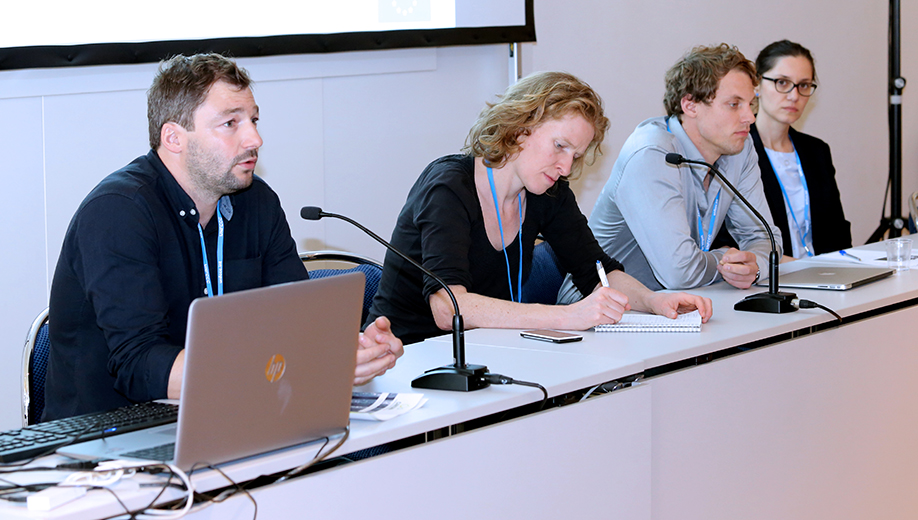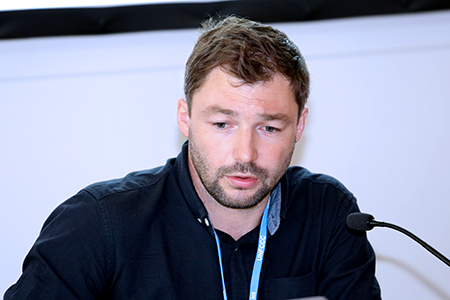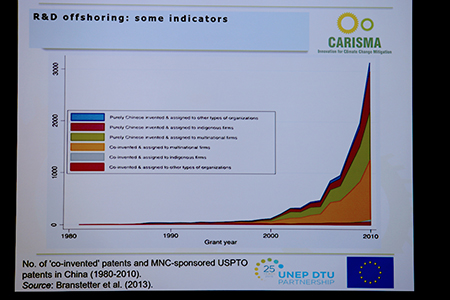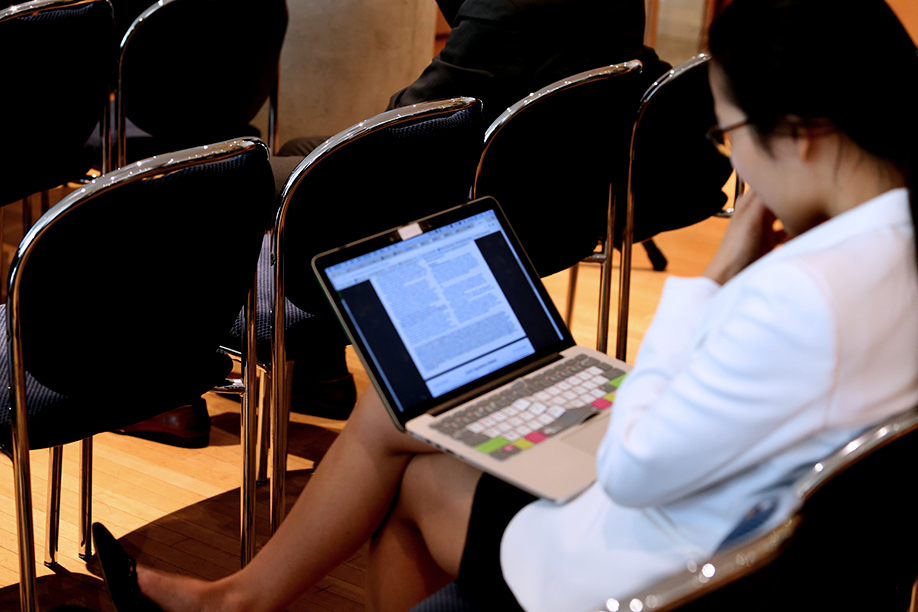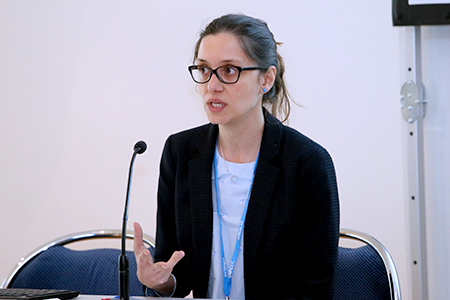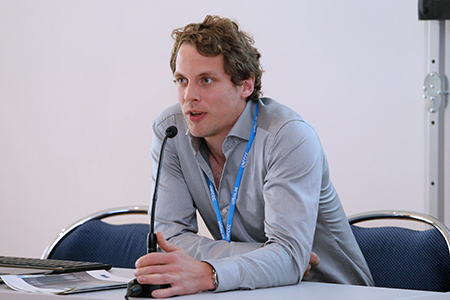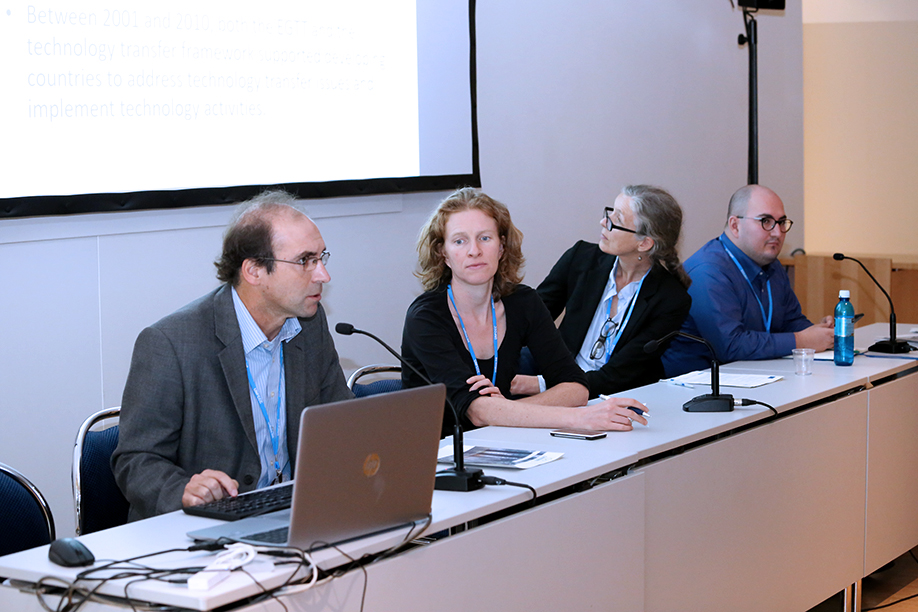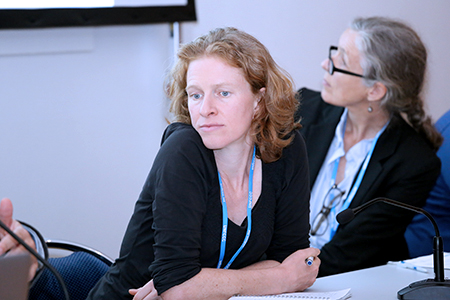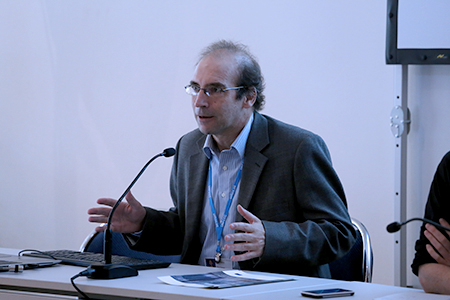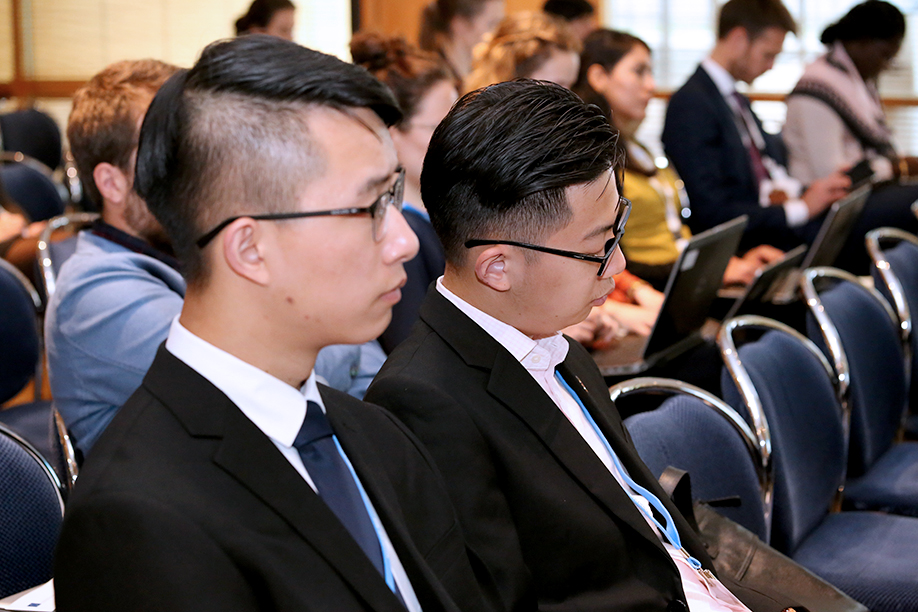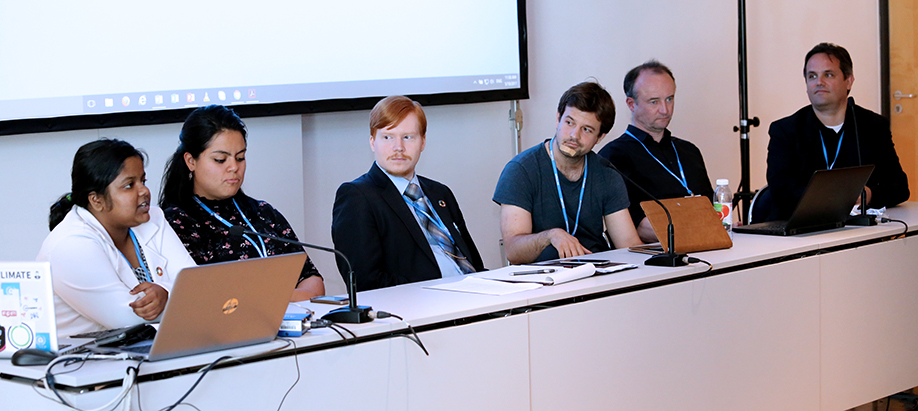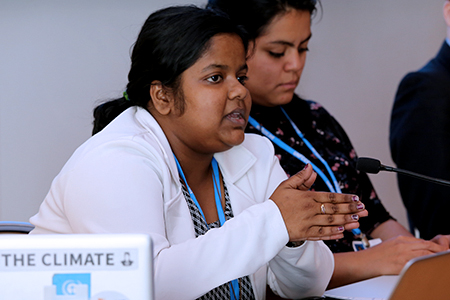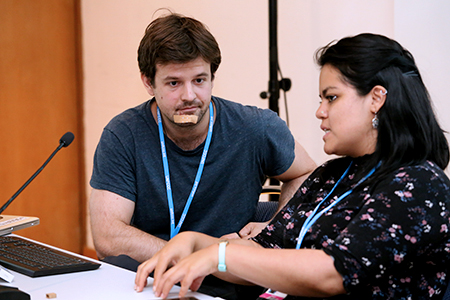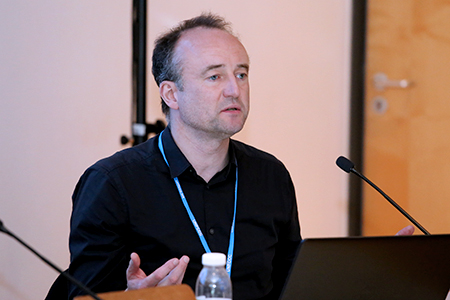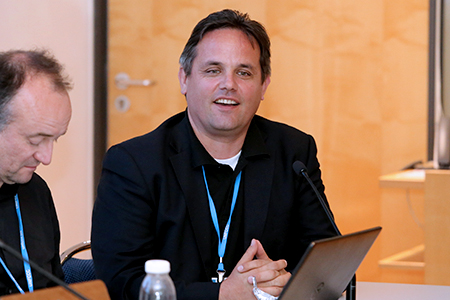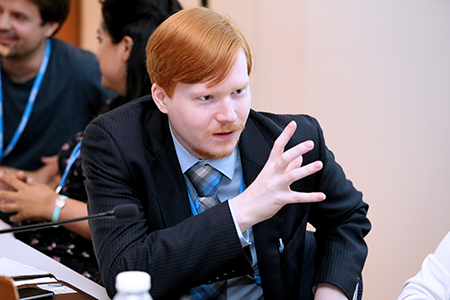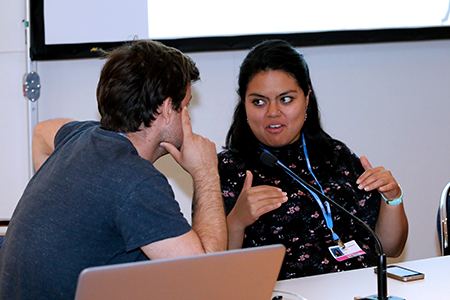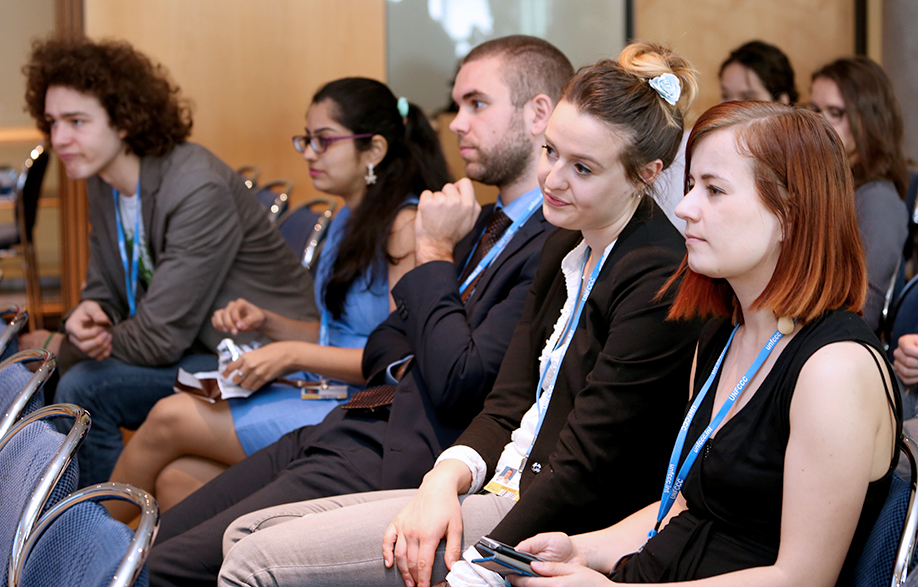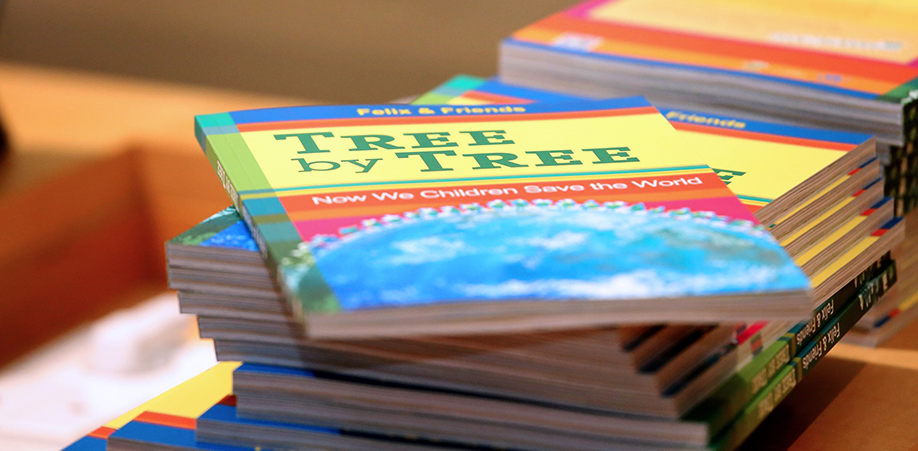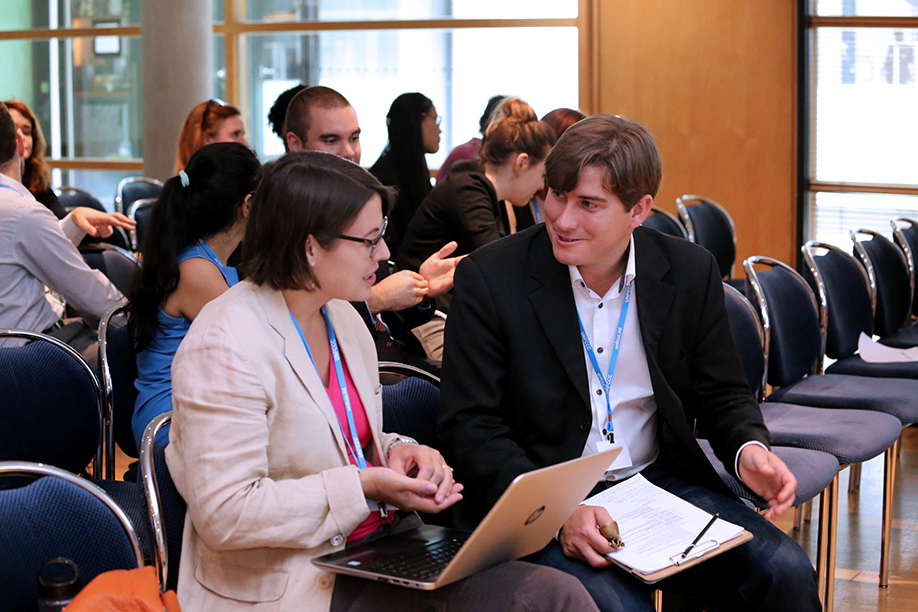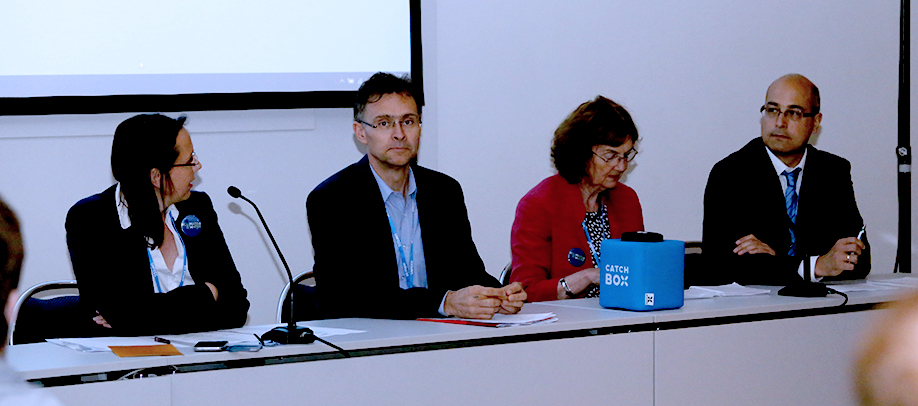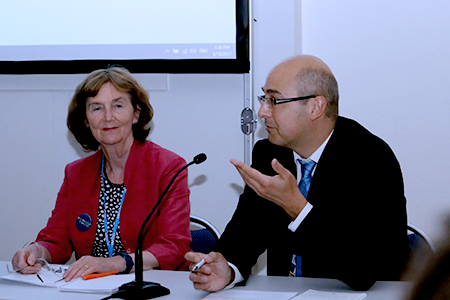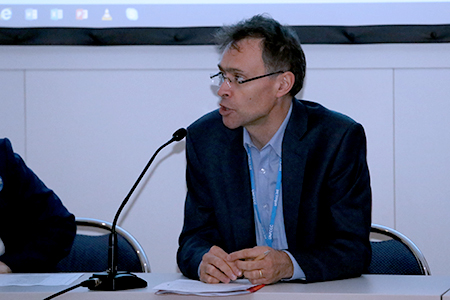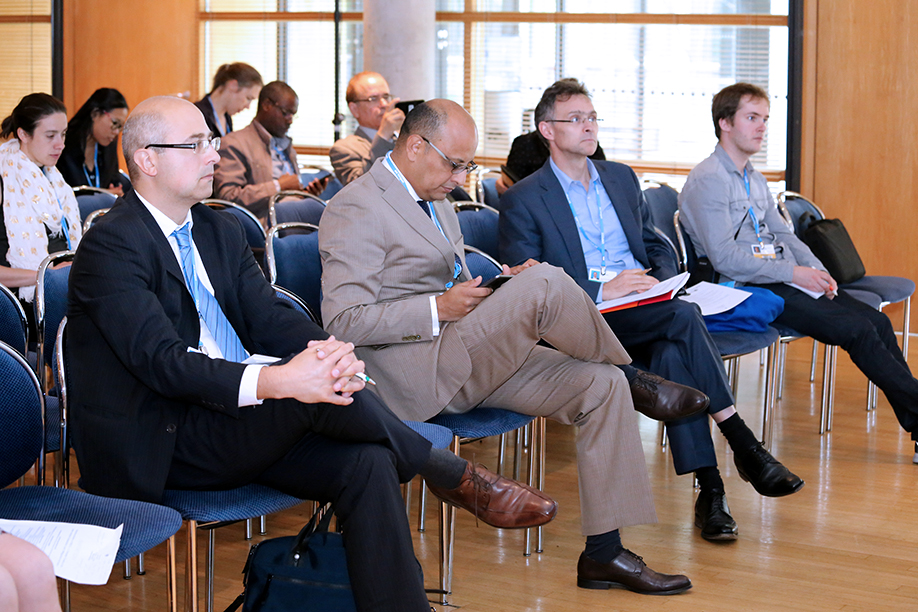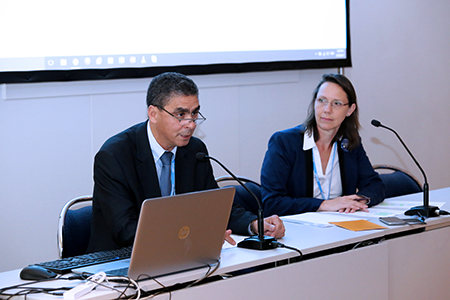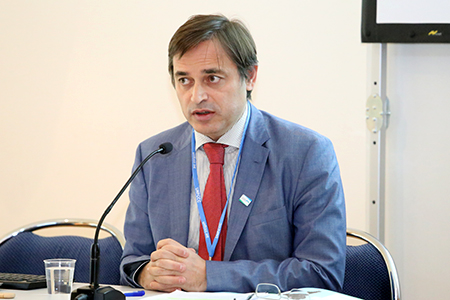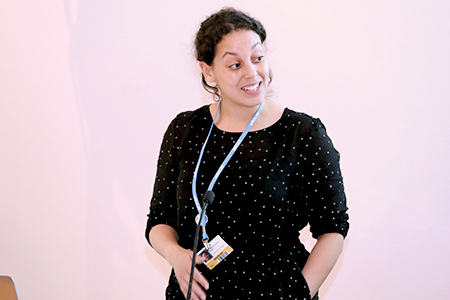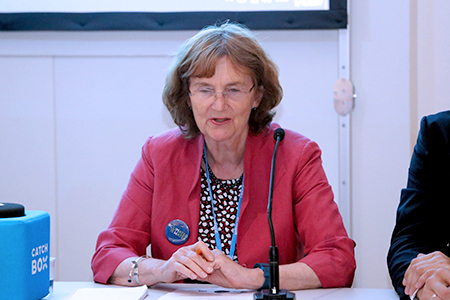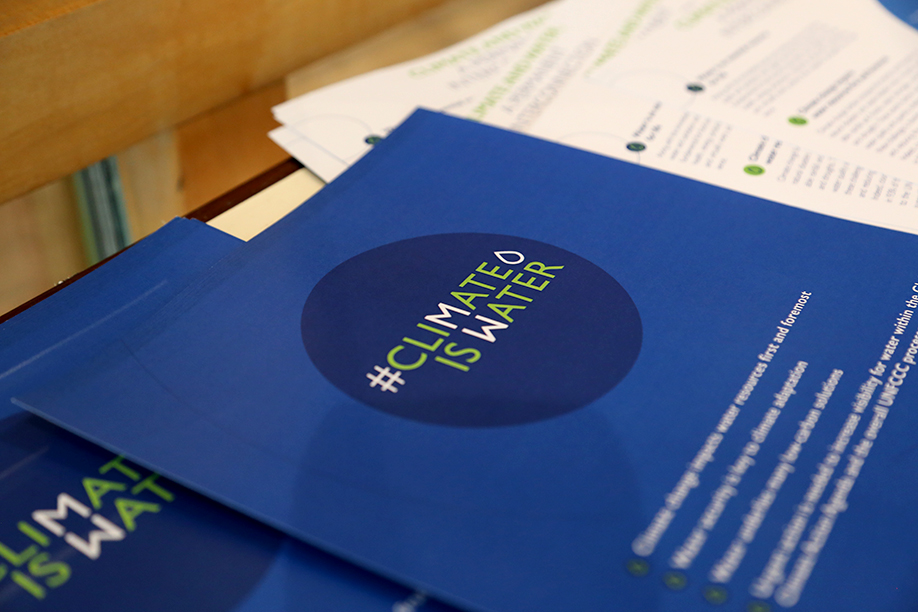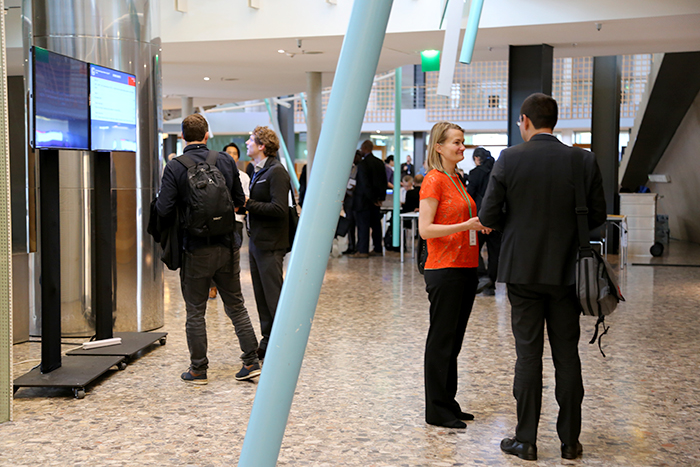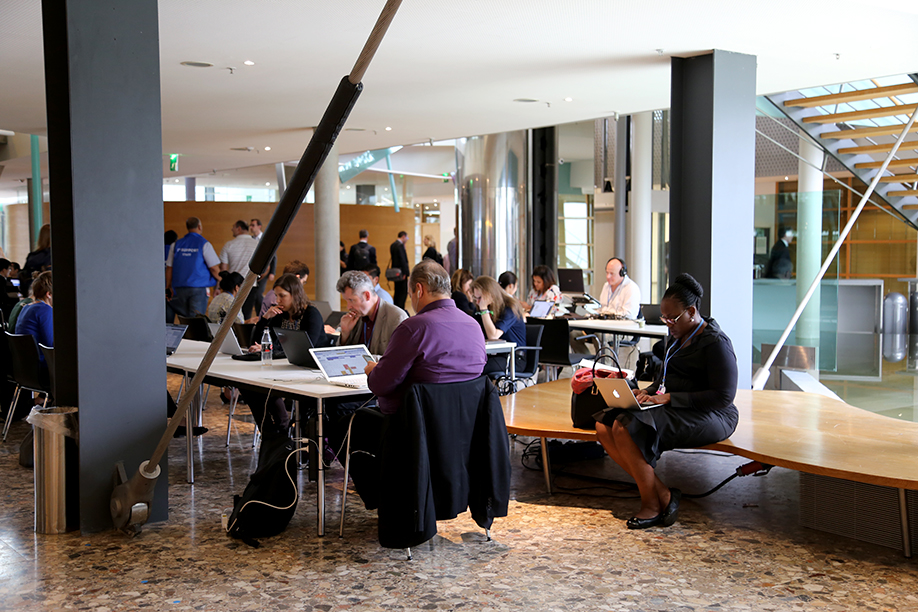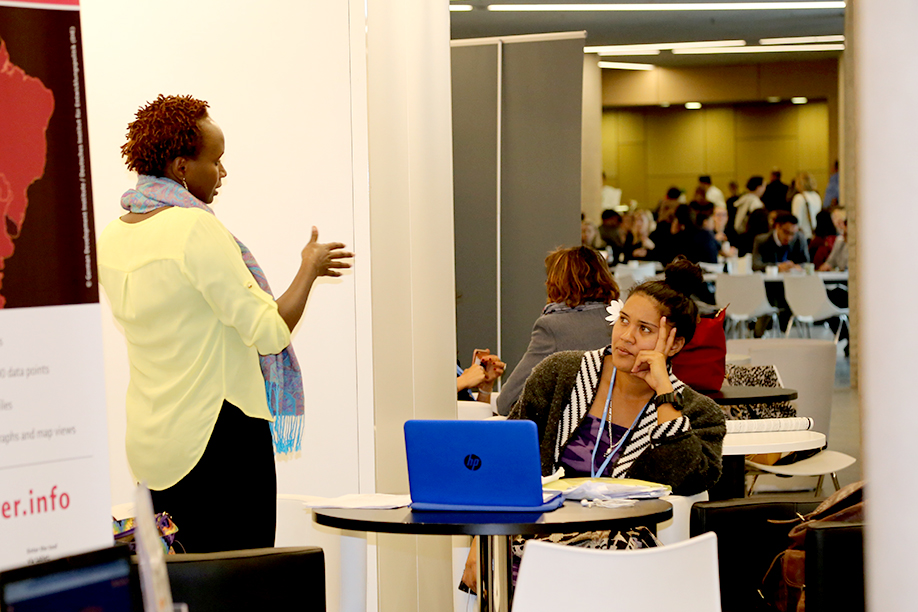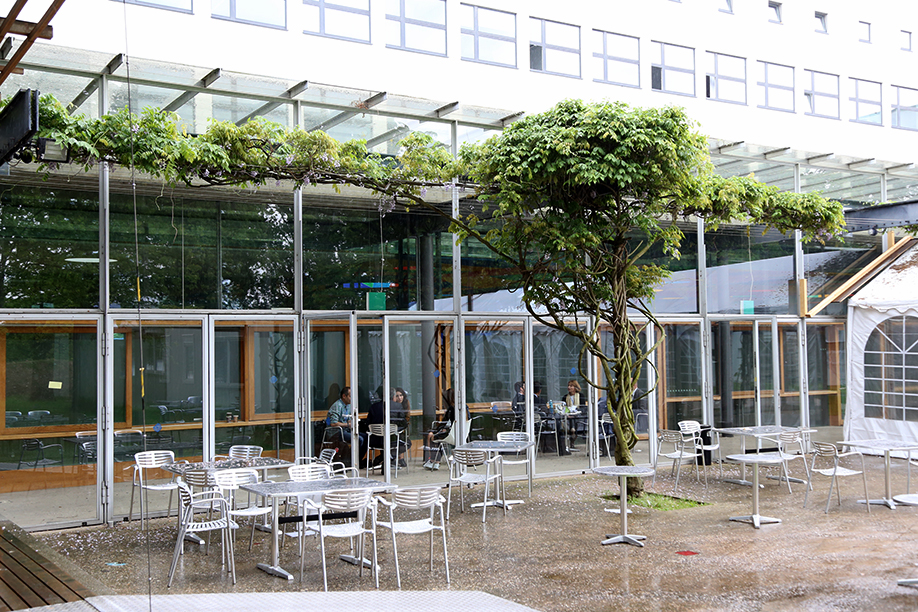Summary
The following side events were covered by ENBOTS on Thursday, 18 May 2017:
- Global Research and Development Cooperation in Climate Technologies: Opportunities and Challenges
- Climate Justice and Youth – An Inter-Generational Dialogue
- Implementation of Nationally Determined Contributions: Climate Finance for Water-Related Adaptation and Mitigation Action
IISD Reporting Services, through its Earth Negotiations Bulletin on the Side (ENBOTS) Meeting Coverage, is providing daily web coverage of selected side events at the Bonn Climate Change Conference, May 2017.
Photos by IISD/ENB | Angeles Estrada Vigil
For photo reprint permissions, please follow instructions at our Attribution Regulations for Meeting Photo Usage Page
Global Research and Development Cooperation in
Climate Technologies: Opportunities and ChallengesPresented by the Joint Implementation Network, the Technical University of Denmark (DTU) and the University of Nijmegen (RU)
This side event explored the implications of global research and development (R&D) cooperation, including with emerging economies, on development and transfer of mitigation technologies. Heleen de Coninck, RU, moderated the event.
Presenting findings from research on “R&D offshoring” to emerging economies by Western multinational companies, Ulrich Elmer Hansen, UNEP DTU Partnership, noted national concerns in the EU and US concerning loss of long-term industrial leadership and “hollowing out” of the home-country knowledge base. At the firm level, he said benefits to R&D offshoring include lower R&D costs and productivity increases, while knowledge management of a globally spread network represents a key challenge. Noting that the literature in this area focuses on the national and regional levels, he stressed the need to examine what can be done at the international level, including within the UNFCCC.
Sören Lindner, RU, presented on research on mapping of collaboration in research and innovation for climate change mitigation between the EU and developing countries. He highlighted that the real drivers and motivations behind initiatives may not be as clear-cut as expressed in project proposals, and emphasized that there is a focus on project “output” instead of more long-term “outcome and impact” considerations among project managers and sponsors. Among recommendations, he highlighted: making the objectives of both partners explicit; and finding and highlighting mutual benefits, and building a relationship based on commonalities among partners.
Martina Lyons, Directorate-General for Research and Innovation (DG R&I), European Commission, presented on the Commission’s technology cooperation with emerging economies. Noting the Commission’s strong involvement in the first stages of the innovation chain, she highlighted the Horizon 2020 programme as the biggest research, development and demonstration (RD&D) programme in the world with a seven-year budget of EUR 6 billion for energy research and innovation. She also drew attention to Mission Innovation, in which 22 countries and the EU are taking action to double their public clean energy R&D investment over five years.
Stressing “RD&D is where the UNFCCC can do the most,” Gabriel Blanco, National University of Central Buenos Aires (UNICEN), welcomed references to RD&D in the Paris Agreement and Decision 1/CP.21 (Adoption of the Paris Agreement). Among reasons why cooperative RD&D is the right way forward, he highlighted, inter alia, the potential for creation of new private enterprises and public-private joint ventures that may lead to the sharing of intellectual property rights (IPRs) and joint patents.
Marieke Reijalt, European Hydrogen Association, highlighted that “the big difference” will be made in emerging economies when it comes to technology implementation, and said EU-funded technologies should be tested for viability in developing countries. She called for: “simplicity” from institutions when it comes to supporting R&D; and a mechanism to further spur industrial interest in technology transfer.
Juan Hoffmaister, Green Climate Fund (GCF), highlighted the Fund’s examination of how collaborative R&D fits into its business model, and said the Fund will present a proposal on this topic in October 2017. Among key challenges the Fund is facing in this regard, he highlighted how to separate the concept of collaborative R&D from the larger technology cycle, and how to ensure that such financing is bankable.
In the ensuing discussion, participants considered, inter alia: the question of whether funding cycles are too short, given an undue focus on outputs over impacts; whether IPRs are an issue in RD&D; differences in motivations between developed and developing countries for participating in RD&D; challenges of making RD&D investments, given that “fruits are uncertain” and more long-term; and the role of culture in shaping outputs and impacts of projects.
L-R: Ulrich Elmer Hansen, UNEP DTU Partnership; Heleen de Coninck, RU; Sören Lindner, RU; and Martina Lyons, DG R&I, European Commission
Ulrich Elmer Hansen, UNEP DTU Partnership, highlighted that R&D is increasingly taking place on the global scale, with China, India and Brazil among key global actors.
Martina Lyons, DG R&I, European Commission, highlighted the Commission’s underlying principles for cooperation in RD&D are mutual benefit and common interest.
Sören Lindner, RU, said projects need a “trust-building” phase, after which sustained collaboration on technology innovation can often begin.
L-R: Gabriel Blanco, UNICEN; Heleen de Coninck, RU; Marieke Reijalt, European Hydrogen Association; and Juan Hoffmaister, GCF
Heleen de Coninck, RU, noted that, to improve capabilities to implement Nationally Determined Contributions, long-term cooperation is more effective than one-off training.
Gabriel Blanco, UNICEN, welcomed the Technology Mechanism’s support for the entire technology cycle.
Contact:
-
-
Wytze van der Gaast | wytze@jin.ngo
- Sara Traerup | slmt@dtu.dk
- Heleen de Coninck | h.deconinck@fnwi.ru.nl
More Information:
Climate Justice and Youth – An Inter-Generational DialoguePresented by the Plant-for-the-Planet and the Global Marshall Plan Foundation
This side event discussed issues related to climate justice and youth, including ways to better engage non-party stakeholders in implementation of the Paris Agreement, and youth initiatives around the world, such as the ‘Trillion Tree Campaign’ by Plant-for-the-Planet. Thomas Bruhn, Institute for Advanced Sustainability Studies (IASS), and Yugratna Srivastava, Plant-for-the-Planet, moderated the discussion.
The event was conducted in an interactive dialogue format, with the audience being given several opportunities to share views with each other and report back to the meeting.
On integrating a broad range of stakeholders in developing the Paris Agreement rulebook, participants highlighted, inter alia, the need to: capture scientific, political and local knowledge; create acceptance, legitimacy and relevance of non-state actor participation; fully integrate empowerment and social learning; and generate sensitivity to “what stakeholders on the ground actually need.”
Miroslav Polzer, Secretary General, International Association for the Advancement of Innovative Approaches to Global Challenges (IAAI), called for stakeholders to facilitate social innovation to advance implementation of Article 12 of the Paris Agreement (climate education) and action on climate empowerment.
Gaston Meskens, Research and Independent Non-governmental Organizations (RINGOs), shared his views on observer participation in the UN Framework Convention on Climate Change (UNFCCC), emphasizing that “the more pressure there is on parties to deliver, the less willing they are to give access to civil society to the negotiations.” He called for dialogue between delegates and civil society in the form of “compassionate confrontation,” which would be “inspiring and liberating for us all.”
On facilitating dialogue among party delegates and civil society, Andreas Sieber, Climate Tracker, explained that his organization trains people online and offline in 22 languages to report on UNFCCC negotiations. Providing examples of writers’ impact on the negotiations, he stressed the importance of focusing on a single issue without losing sight of the “bigger picture.”
Following a brief informal exchange of views, participants underscored, inter alia: the importance of maximizing the impact of youth; and the inverse relationship between stakeholder participation and pressure exerted on party delegates, noting the differences between short-term and long-term pressure.
Timothy Damon, Global Youth Development Institute (GYDI), highlighted the reference to “intergenerational equity” in the preamble of the Paris Agreement, and stressed the need to have civil society onboard for Article 12 (education and training) implementation. He outlined GYDI’s efforts in: bringing youth from the global South to participate in climate negotiations; and national and regional capacity building.
Berenice Danaé Espinoza Hernández, CLIC!, emphasized the need for non-party stakeholders to not only be included in the negotiation process, but also to continue work in their own countries. Highlighting the importance of regional cooperation, she cautioned against creating divisions between the global North and global South within the youth caucus.
In the ensuing discussion, participants considered, inter alia: the need for early climate education; the need for scholarships to increase representation of the global South financed through innovative fundraising; the innovative format of the side event and the need for co-productive settings that create a social learning space; and the implications of discussions on conflict of interest on observer participation.
L-R: Yugratna Srivastava, Plant-for-the-Planet; Berenice Danaé Espinoza Hernández, Clic!; Timothy Damon, GYDI; Andreas Sieber, Climate Tracker; Gaston Meskens, RINGOs; and Miroslav Polzer, Secretary General, IAAI
Yugratna Srivastava, Plant-for-the-Planet, highlighted Subsidiary Body for Implementation conclusions, underscoring the value of non-party stakeholders’ effective engagement and their contributions to the deliberations on substantive issues.
Andreas Sieber, Climate Tracker (left), said it is important to give voice to, as well as “lay demands” on, youth.
Gaston Meskens, RINGOs, noted that the “UNFCCC process is complex and slow, but it is the only one we have; without it, all the climate decisions would be taken in Davos.”
Miroslav Polzer, Secretary General, IAAI, called for identifying how activities on education, communication and outreach could be documented and used to feed into Paris Agreement implementation.
Timothy Damon, GYDI, highlighted the need to hear the “vibrant” voices of all stakeholders in the climate negotations to enable Paris Agreement implementation on the ground.
Berenice Danaé Espinoza Hernández, Clic!, said “we’re all global youth and we’re together in this.”
Elena Kosolapova, ENBOTS team, and Thomas Bruhn, IASD
Contact:
-
Yugratna Srivastava | yugratna@gmail.com
Frithjof Finkbeiner | frithjof.finkbeiner@globalmarshallplan.org
More Information:
Implementation of Nationally Determined Contributions:
Climate Finance for Water-Related Adaptation and Mitigation ActionPresented by the World Water Council (WWC), the Global Water Partnership (GWP) and the International Water Association (IWA)
In this side event, participants discussed climate change impacts on the water cycle, water security as a priority within Nationally Determined Contributions (NDCs), and unrecognized mitigation opportunities in water systems.
Dani Gaillard-Picher, Director, WWC, moderated the event. Highlighting the ‘Climate is Water’ initiative, she said that “water is talked about everywhere” but still not given the “attention it deserves.” Gaillard-Picher stressed that water should be a priority in NDCs.
Moulay Driss Hasnaoui, Morocco, underscored the importance of water security in countries “lagging behind” in the water, energy and agriculture sectors.
Eva Promes, IWA, highlighted IWA’s Flood and Drought Portal, a technical tool which supports decision making at the regional and water basin levels.
Underscoring the multiple co-benefits of water investments, Alexander Linke, Deutsche Gesellschaft für Internationale Zusammenarbeit (GIZ), said that improving regulatory environments and knowledge management of water utilities will be key to implementing concrete projects.
Gareth Phillips, African Development Bank (AfDB), reminded participants that the long-term challenge in climate policy is to reach net zero emissions, and stressed the need to “systematically drive down” emission intensity across sectors. Noting that there is currently no financial reward for the private sector to invest in adaptation, he highlighted a proposed adaptation benefit mechanism as a potential solution.
Merylyn Hedger, Overseas Development Institute (ODI), underscored the centrality of water to the climate agenda. She called for a “scaling up” of adaptation and mitigation efforts using a “programmatic” rather than a project-based approach.
Noting that water insecurity is estimated to cost the world economy 45% of global GDP by 2050, Nicolas Delaunay, GWP, underscored that water security is key for adaptation planning and building the climate resilience of communities and ecosystems. He highlighted GWP’s Global Water, Climate and Development programme, which supports implementation of climate change commitments in 16 developing countries.
During the ensuing discussion, participants addressed, inter alia: limitations to mitigation opportunities in Africa; sectoral policy approaches to address water challenges in climate policy; methodologies for calculating emission intensity for different services in the economy; and technologies that both generate electricity and are “water-wise.”
In closing, Jean-Luc Redaud, French Water Partnership, echoed the importance of water as a priority action in NDCs and called for a continued strengthening of water governance.
L-R: Danielle Gaillard-Picher, Director, WWC; Gareth Phillips, AfDB; Merylyn Hedger ODI; and Alexander Linke, GIZ
Alexander Linke, GIZ, noted the importance of working with water utilities at the local level.
Gareth Philips, AfDB, said the Bank can play a role in creating enabling environments for adaptation and mitigation projects.
Moulay Driss Hasnaoui, Morocco, emphasized the importance of securing funding to support water security.
Nicolas Delaunay, GWP, said that "within the next generation" more than 70% of the world’s population will live in vulnerable coastal and flood-prone areas.
Eva Promes, IWA, highlighted IWA projects in Mexico, Thailand, Peru and Jordan.
Merylyn Hedger, ODI, pointed to a “massive gap” between financing interests and bankable projects available for funding.
Contact:
-
Danielle Gaillard-Picher | d.gaillard@worldwatercouncil.org
Susanne Skyllerstedt | Susanne.skyllerstedt@gmail.com
Eva Promes | eva.promes@iwahq.org
